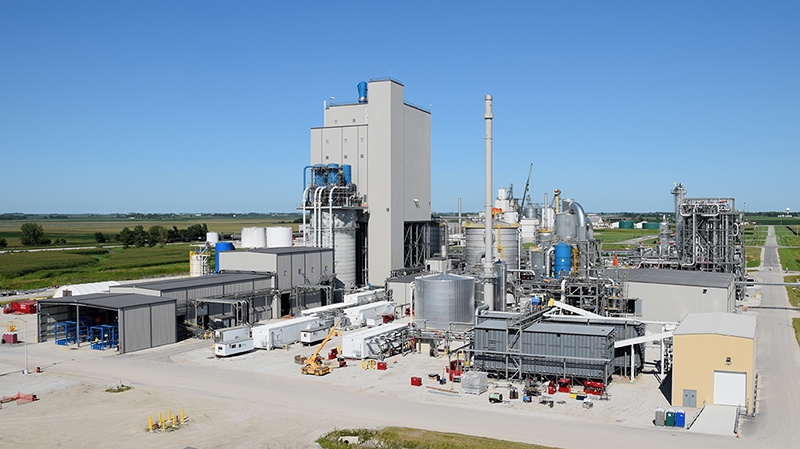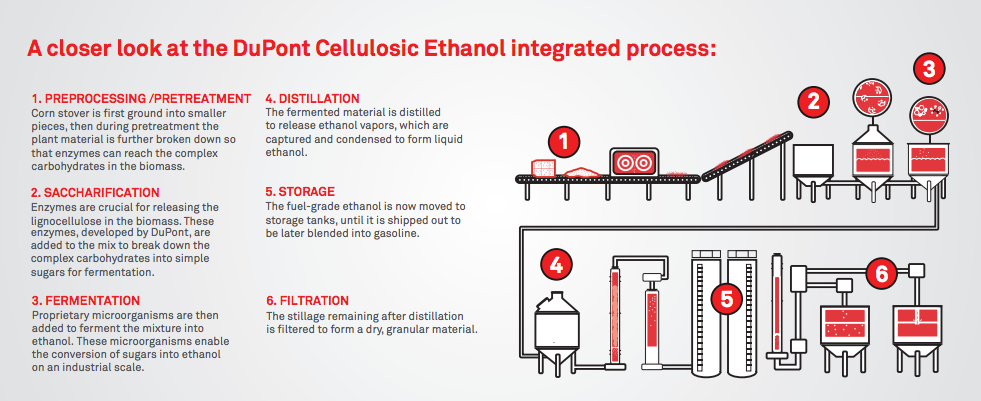
DuPont opens world’s largest cellulosic ethanol plant
October 30, 2015
By
Andrew Snook
October 30, 2015 – Today, DuPont celebrated the opening of its cellulosic biofuel facility in Nevada, Iowa. The biorefinery is the world’s largest cellulosic ethanol plant, with the capacity to produce 30 million gallons per year of clean fuel that offers a 90 per cent reduction in greenhouse gas emissions as compared to gasoline.
 DuPont's Cellulosic Ethanol Facility
DuPont's Cellulosic Ethanol Facility The raw material used to produce the ethanol is corn stover – the stalks, leaves and cobs left in a field after harvest. The facility will demonstrate at commercial scale that non-food feedstocks from agriculture can be the renewable raw material to power the future energy demands of society. Cellulosic ethanol will further diversify the transportation fuel mix just as wind and solar are expanding the renewable options for power generation.
Vital to the supply chain and the entire operation of the Nevada biorefinery are close to 500 local farmers, who will provide the annual 375,000 dry tons of stover needed to produce this cellulosic ethanol from within a 30-mile radius of the facility. In addition to providing a brand-new revenue stream for these growers, the plant will create 85 full-time jobs at the plant and more than 150 seasonal local jobs in Iowa.
“Iowa has a rich history of innovation in agriculture,” said Iowa Gov. Terry Branstad. “Today we celebrate the next chapter in that story, using agricultural residue as a feedstock for fuel, which brings both tremendous environmental benefits to society and economic benefits to the state. The opening of DuPont’s biorefinery represents a great example of the innovation that is possible when rural communities, their government and private industry work together toward a common goal.”
The majority of the fuel produced at the Nevada, Iowa, facility will be bound for California to fulfill the state’s Low Carbon Fuel Standard where the state has adopted a policy to reduce carbon intensity in transportation fuels. The plant also will serve as a commercial-scale demonstration of the cellulosic technology where investors from all over the world can see firsthand how to replicate this model in their home regions.
DuPont’s achievement provides the technology that will transform the U.S. fuel supply enabling a transition to fulfill the original cellulosic ethanol volume targets as Congress intended when it passed the Renewable Fuel Standard, a regulation established in 2005 to encourage growth and investment in sustainable fuel solutions. Earlier this month, DuPont and America’s Renewable Future released new poll findings that suggested Iowa caucus-goers from both parties – 61 percent of Republicans and 76 percent of Democrats – would be more likely to vote for a presidential candidate who supports the Renewable Fuel Standard and renewable fuels.
To check out a video of DuPont’s process for converting biomass to cellulosic ethanol, click here: www.youtube.com/watch?v=77Mu-0fGJ2s&feature=youtu.be.

About DuPont
DuPont (NYSE: DD) has been bringing world-class science and engineering to the global marketplace in the form of innovative products, materials, and services since 1802. The company believes that by collaborating with customers, governments, NGOs, and thought leaders we can help find solutions to such global challenges as providing enough healthy food for people everywhere, decreasing dependence on fossil fuels, and protecting life and the environment. For additional information about DuPont and its commitment to inclusive innovation, please visit www.dupont.com/.
Forward-Looking Statements: This document contains forward-looking statements which may be identified by their use of words like “plans,” “expects,” “will,” “believes,” “intends,” “estimates,” “anticipates” or other words of similar meaning. All statements that address expectations or projections about the future, including statements about the company’s strategy for growth, product development, regulatory approval, market position, anticipated benefits of recent acquisitions, timing of anticipated benefits from restructuring actions, outcome of contingencies, such as litigation and environmental matters, expenditures and financial results, are forward looking statements. Forward-looking statements are not guarantees of future performance and are based on certain assumptions and expectations of future events which may not be realized. Forward-looking statements also involve risks and uncertainties, many of which are beyond the company’s control. Some of the important factors that could cause the company’s actual results to differ materially from those projected in any such forward-looking statements are: fluctuations in energy and raw material prices; failure to develop and market new products and optimally manage product life cycles; ability to respond to market acceptance, rules, regulations and policies affecting products based on biotechnology; significant litigation and environmental matters; failure to appropriately manage process safety and product stewardship issues; changes in laws and regulations or political conditions; global economic and capital markets conditions, such as inflation, interest and currency exchange rates; business or supply disruptions; security threats, such as acts of sabotage, terrorism or war, weather events and natural disasters; ability to protect and enforce the company’s intellectual property rights; successful integration of acquired businesses and separation of underperforming or non-strategic assets or businesses, including timely realization of the expected benefits from the separation of Performance Chemicals. The company undertakes no duty to update any forward-looking statements as a result of future developments or new information.
Source: DuPont
Print this page